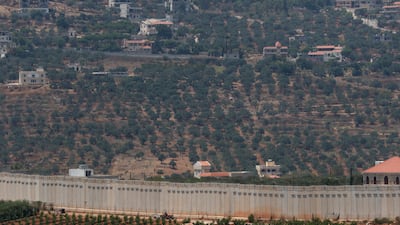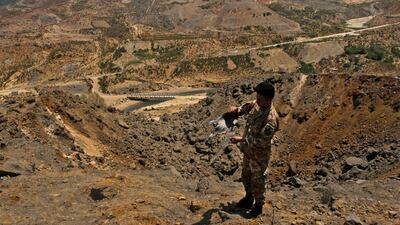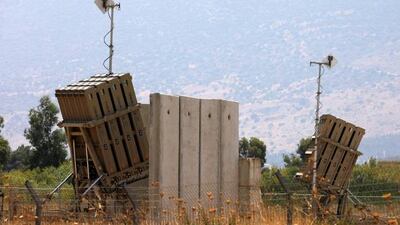Hezbollah said on Friday that it had launched dozens of rockets towards Israel in response to Israeli air strikes in Lebanon on Thursday, triggering retaliatory shelling from Israel.
The Iran-backed Lebanese group said it had “bombed open lands in the vicinity of Israeli-occupied Shebaa farms with dozens of 122mm rockets”.
A Lebanese army spokesperson told The National that an undetermined number of rockets were launched from the town of Chouaya on Friday morning. The army later said it arrested four people in Chouaya for launching rockets and confiscated the launcher.
No casualties were reported on either side. This is the first serious flare-up in tensions since a cross-border attack in the summer of 2019 and comes after weeks of unclaimed rocket launches from Lebanon into Israel.
Israel responded with shelling over the Lebanese region of Arkoub which ended early afternoon, according to Hezbollah-affiliated media. "We will not let attacks on Israeli civilians go unanswered," the Israeli army said on Twitter.
The shelling caused wildfires in the area, the Lebanese army said.
Hezbollah's rockets triggered sirens in northern Israel and in the Israeli-occupied Golan Heights. Israeli media reported that some of the rockets were intercepted by Israel's Iron Dome defence system.
The Israeli military said sirens sounded in the Upper Galilee in northern Israel, and in the Golan Heights, part of territory Israel captured in the 1967 Middle East war.
In a statement shared with The National, the United Nations Interim Force in Lebanon, which patrols the border area, said that it "detected rocket launches from outside UNIFIL’s area of operations in south Lebanon toward Israeli-occupied Golan" on Friday morning. "This was followed almost immediately by an artillery response from Israel in the Shebaa Farms area."
"This is a very dangerous situation, with escalatory actions seen on both sides over the past two days," the statement added. "UNIFIL calls on the parties to cease fire and maintain calm so we can begin an investigation."
Former prime minister Saad Hariri took aim at Hezbollah without naming the party, saying "south Lebanon should not be used as a platform to settle regional conflicts".
"Lebanon is not part of the Iranian-Israeli clash in the Gulf of Oman, and the state, with its legitimate military and security forces, is responsible for protecting citizens and upholding sovereignty," the Future Movement leader said.
Caretaker prime minister Hassan Diab urged the UN to pressure Israel to halt its violations of Lebanese sovereignty and international resolutions, saying he engaged in talks to contain the situation.
Residents of Chouaya stopped Hezbollah militants passing through the town in the late morning after rockets were fired at Israel. Videos of the incident widely shared on social media show villagers blocking a truck loaded with rockets.
In a statement, Hezbollah confirmed that "when resistance fighters returned from their work and were passing through the region of Chouaya in the district of Hasbaya, a number of citizens objected to them".
Hezbollah said that it was careful to not expose the Lebanese to harm during "its work".
But videos of the incident seem to indicate that locals from the majority Druze town were angered because they felt that Hezbollah was exposing them to harm.
"They don't like their villages to be targets," said Makram Rabah, a history professor at the American University of Beirut.
Hezbollah, which claims to represent Lebanon's Shiite Muslim population, is the strongest political force in south Lebanon.
Druze leader Walid Joumblatt told The National that he was mediating with Hezbollah following the incident.
"We need calm," he said. "It wasn't the moment to fire rockets near a Druze village towards Israeli positions."
On Thursday, Israeli fighter jets struck deep inside Lebanese territory for the first time since the month-long war between Hezbollah and Israel in the summer of 2006.
Lebanese media reported that the Israeli jets struck twice in an uninhabited area close to the town of Mahmoudieh in south Lebanon.
Lebanese President Michel Aoun said the attack signalled Israel’s “escalatory and aggressive intentions”.









